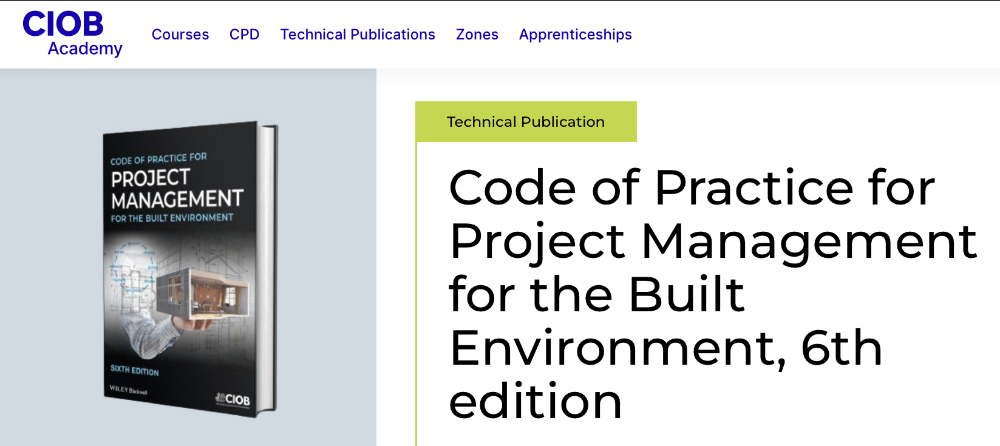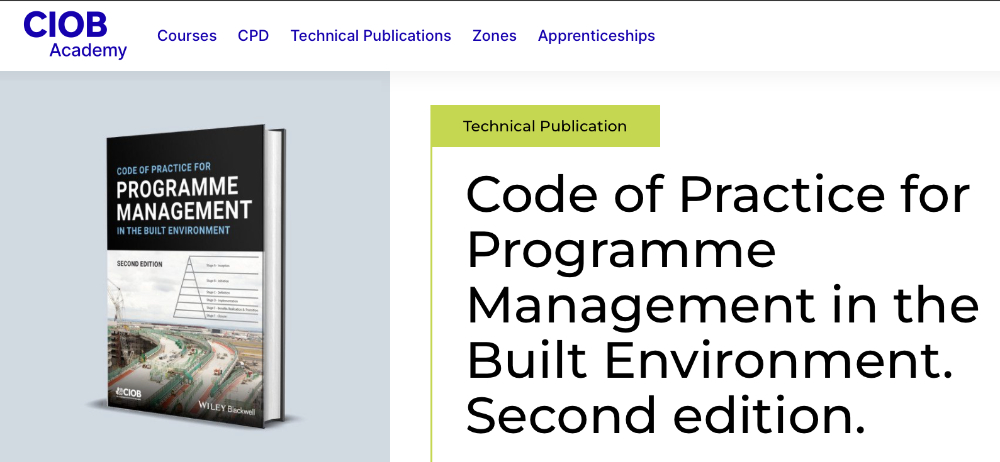Built environment project and programme management codes of practice
A project is a series of related a tasks which when they are carried in the correct order will lead to the completion of the project. Projects will tend to run independently of the businesses involved in them and follow their own schedule. A programme is a series of interrelated projects that may be carried out repeatedly or continuously in order to support an ongoing process.they tend to be integral to the businesses carrying them.
[edit] The Code of Practice for Project Management for the Built Environment
The latest (sixth) edition of construction project management processes, set within the context of a number of key drivers in the industry, including the need for smart and sustainable solutions and increased value, innovation, safety and informationsharing.
The Code of Practice for Project Management for the Built Environment delivers an up-to-date and comprehensive reference to the principles and practice of project management in construction and development. This latest (6th) edition covers the new technologies, internationalisation, changing legislation, and productivity and profitability challenges faced by contractorsthat are driving significant change in the industry.
A thorough walk through of project inception, feasibility analysis, strategy, and the pre-construction process. Plus comprehensive explorations of the construction stage of projects, as well as testing and commissioning, and projectcompletion, handover, and operation.
This article appears on the CIOB Academy website as 'Code of Practice for Project Management for the Built Environment, 6th edition'.
[edit] Code of Practice for Programme Management in the Built Environment. Second edition
This second edition of the Code of Practice for Programme Management in the Built Environment is a natural developmentfrom the first edition and builds on the recently published 6th edition of the highly successful Code of Practice for Project Management for the Built Environment.
The sixth edition for Project Management continues to provide the relevant guidance and procedural requirements for the successful management of individual projects. This second edition of Programme Management further develops the elements of functionality and procedures specific to the management and successful delivery of a number of related projectswithin the built environment, focussed at the programme level on the coordinated creation of value, which presents itself as a trade-off in the relationship between:
- Benefits and outcomes (via outputs);
- Risks and opportunities;
- Requirements and objectives (incl. cost and time).
- Authored and supported by industry and government experts in the field.
This article appears on the CIOB Academy website as 'Code of Practice for Programme Management in the Built Environment. Second edition'.
--CIOB
[edit] Related articles on Designing Buildings
- CIOB articles,
- Code of Practice for Programme Management in the Built Environment. Second edition.
- Code of Practice for Project Management for the Built Environment, 6th edition.
- Design management.
- Portfolio v programme.
- Preliminary business case.
- Project execution plan.
- Project management.
- Risk management.
- Value management.
Featured articles and news
Construction Skills Mission Board launch sector drive
Newly formed government and industry collaboration set strategy for recruiting an additional 100,000 construction workers a year.
New Architects Code comes into effect in September 2025
ARB Architects Code of Conduct and Practice available with ongoing consultation regarding guidance.
Welsh Skills Body (Medr) launches ambitious plan
The new skills body brings together funding and regulation of tertiary education and research for the devolved nation.
Paul Gandy FCIOB announced as next CIOB President
Former Tilbury Douglas CEO takes helm.
UK Infrastructure: A 10 Year Strategy. In brief with reactions
With the National Infrastructure and Service Transformation Authority (NISTA).
Ebenezer Howard: inventor of the garden city. Book review.
The Grenfell Tower fire, eight years on
A time to pause and reflect as Dubai tower block fire reported just before anniversary.
Airtightness Topic Guide BSRIA TG 27/2025
Explaining the basics of airtightness, what it is, why it's important, when it's required and how it's carried out.
Construction contract awards hit lowest point of 2025
Plummeting for second consecutive month, intensifying concerns for housing and infrastructure goals.
Understanding Mental Health in the Built Environment 2025
Examining the state of mental health in construction, shedding light on levels of stress, anxiety and depression.
The benefits of engaging with insulation manufacturers
When considering ground floor constructions.
Lighting Industry endorses Blueprint for Electrification
The Lighting Industry Association fully supports the ECA Blueprint as a timely, urgent call to action.
BSRIA Sentinel Clerk of Works Training Case Study
Strengthening expertise to enhance service delivery with integrated cutting-edge industry knowledge.
Impact report from the Supply Chain Sustainability School
Free sustainability skills, training and support delivered to thousands of UK companies to help cut carbon.
The Building Safety Forum at the Installershow 2025
With speakers confirmed for 24 June as part of Building Safety Week.
The UK’s largest air pollution campaign.
Future Homes Standard, now includes solar, but what else?
Will the new standard, due to in the Autumn, go far enough in terms of performance ?
BSRIA Briefing: Cleaner Air, Better tomorrow
A look back at issues relating to inside and outside air quality, discussed during the BSRIA briefing in 2023.
Restoring Abbotsford's hothouse
Bringing the writer Walter Scott's garden to life.
Reflections on the spending review with CIAT.





























